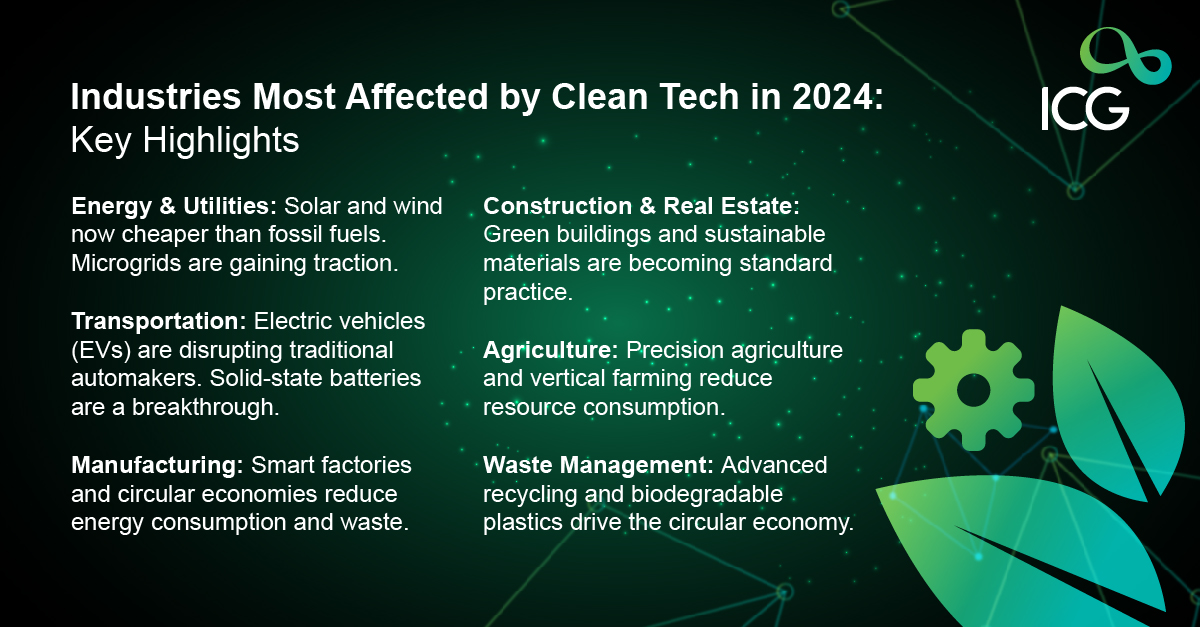Clean technology, or “cleantech,” is transforming industries worldwide, as companies race to adopt sustainable practices to reduce their carbon footprints and meet global climate goals. Clean tech innovations encompass renewable energy, energy efficiency, waste management, and sustainable transportation, impacting virtually every sector. As these innovations gain momentum, they are reshaping industries in unprecedented ways.
In this article, we’ll explore the industries most affected by clean tech innovations and how they are adapting to this new era of sustainability.
- Energy and Utilities
The energy sector is at the heart of the clean tech revolution. Traditional fossil fuel-based power generation is being rapidly replaced by renewable energy sources such as solar, wind, and hydropower. This shift has far-reaching implications for energy companies, utilities, and grid operators.
Solar and Wind Energy
Solar and wind power have become the backbone of the renewable energy sector. Once considered expensive, technological advancements have significantly reduced the cost of solar panels and wind turbines.
Solar and wind power have become the backbone of the renewable energy sector. Once considered expensive, technological advancements have significantly reduced the cost of solar panels and wind turbines. According to Statista, solar energy costs have dropped by over 80% since 2010, while wind energy is now cheaper than fossil fuels in many regions.
Impact on the Energy Sector
The shift to renewable energy has led to job creation in clean energy fields, while traditional fossil fuel jobs are being phased out. According to a report by McKinsey, energy companies must adapt by diversifying their portfolios, investing in renewables, and implementing smart grid technologies to manage fluctuating supply and demand.
- Transportation
The transportation industry is undergoing one of the most significant transformations due to clean tech innovations, particularly with the rise of electric vehicles (EVs) and advancements in battery technology.
Electric Vehicles (EVs)
EVs are quickly emerging as a cleaner alternative to traditional internal combustion engines. Gartner predicts that by 2030, EVs will account for 45% of all global vehicle sales, a significant leap from current figures. Companies like Tesla and Rivian, along with traditional automakers such as Ford and GM, are leading the charge in EV production.
Impact on the Transportation Sector
As EVs become more widespread, the demand for gasoline and diesel is declining, impacting traditional automakers and the oil industry. A recent report from McKinsey estimates that fuel demand in the transportation sector will drop by 30% by 2040 due to the shift toward EVs and sustainable fuels.
- Manufacturing and Heavy Industry
Manufacturing, construction, and heavy industries are some of the largest contributors to global carbon emissions. Clean tech innovations are helping these industries adopt more sustainable practices and reduce their environmental impact.
Energy-Efficient Manufacturing
Manufacturers are increasingly using energy-efficient equipment and processes to lower energy consumption and reduce greenhouse gas emissions. Smart factories, powered by artificial intelligence and the Internet of Things (IoT), are optimizing production lines, reducing waste, and conserving energy.
Circular Economy in Manufacturing
The concept of a circular economy is also gaining traction in manufacturing. Instead of following a linear model—where products are made, used, and discarded—companies are focusing on reusing, recycling, and repurposing materials. Innovations in recycling technologies allow manufacturers to recover valuable materials like metals, plastics, and electronic waste, reducing the need for raw resources and minimizing environmental harm.
Impact on the Manufacturing Sector
Adopting energy-efficient machinery and circular economy models leads to significant cost savings and enhances sustainability. McKinsey has noted that many companies are now being pushed to adopt these measures due to stricter environmental regulations.

- Construction and Real Estate
The construction and real estate industries are notorious for their high levels of energy consumption and resource use. However, clean tech innovations are driving these sectors towards more sustainable practices, particularly through green building technologies.
Green Buildings
Green building standards, such as LEED and BREEAM, are promoting the use of sustainable materials and energy-efficient technologies. A report by Gartner suggests that by 2025, 60% of new constructions globally will incorporate some form of green building technology.
Sustainable Construction Materials
Innovations in construction materials are also having a significant impact. Companies are developing sustainable materials such as recycled steel, low-carbon concrete, and cross-laminated timber, which have a lower environmental footprint than traditional building materials.
Impact on the Construction Industry
As the demand for sustainable buildings grows, real estate developers and construction companies must prioritize green technologies and materials. In addition to reducing environmental impact, green buildings are more attractive to buyers and tenants, offering lower energy costs and a healthier living environment.
- Agriculture and Food Production
Agriculture is one of the industries most affected by climate change, as rising temperatures and extreme weather events disrupt traditional farming practices. Clean tech innovations are helping the agricultural sector become more resilient and sustainable.
Precision Agriculture
Precision agriculture uses technology to monitor and manage crops more effectively. Farmers can now use drones, sensors, and AI-driven analytics to track soil health, water usage, and crop growth, allowing for more efficient use of resources.
Sustainable Farming Practices
Clean tech is also enabling vertical farming and hydroponics, which allow for the growth of crops in controlled environments, reducing the need for water and pesticides. These methods can be used in urban areas, helping reduce transportation emissions associated with long supply chains.
Impact on the Agricultural Sector
Clean tech innovations are helping the agricultural sector move away from resource-intensive practices. According to IMF predictions, adopting clean tech in agriculture could reduce global food costs by 10% by 2030.
- Waste Management and Recycling
The waste management and recycling sectors are being transformed by clean tech innovations aimed at reducing the environmental impact of waste disposal and maximizing resource recovery.
Advanced Recycling Technologies
New recycling technologies are making it easier to process materials that were once difficult or uneconomical to recycle. For example, chemical recycling breaks down plastics into their original components, allowing them to be reused in new products. Biodegradable plastics are also being developed, which break down more quickly than traditional plastics, reducing pollution.
Circular Waste Management
The concept of a circular economy is playing a significant role in waste management. Instead of sending products to landfills, companies are focusing on recycling and reusing materials to create new products. This approach not only conserves resources but also reduces the carbon footprint associated with waste disposal.
Impact on the Waste Management Industry
The shift toward more efficient recycling and waste management technologies is creating new business opportunities in the sector. Companies that embrace clean tech innovations will lead the way in reducing waste and supporting a circular economy.
The Future of Clean Tech in Industry
Clean tech innovations are reshaping industries across the globe, forcing companies to rethink how they operate and adapt to a more sustainable future. The energy, transportation, manufacturing, construction, agriculture, and waste management sectors are among those most affected by this transformation.
As clean tech continues to advance, industries will benefit from increased efficiency, cost savings, and new business opportunities. However, companies that fail to embrace these innovations may struggle to remain competitive in a world that increasingly values sustainability. By adopting clean tech solutions, businesses can contribute to a cleaner, greener future while positioning themselves for long-term success.
The ICG Approach
At ICG, we offer a customized approach that empowers your teams with the latest insights and technology expertise to navigate the demands of today’s digital age. As Saudi Arabia embarks on its digital transformation journey, ICG plays a pivotal role in shaping the Kingdom’s tech landscape by providing cutting-edge solutions, strategic consultancy, and fostering innovation. Our comprehensive guidance, from fundamental concepts to practical implementation, helps organizations mitigate risks, stay ahead of the competition, and unlock their full potential in the accelerating digital environment.
Ready to talk?
Request your free Consultation to learn more about ICG’s capabilities and enablement to embark on a transformative expedition toward the summit of success.








